Unilever's Operational Management: Leadership, Roles, and Theories
VerifiedAdded on 2021/01/01
|18
|5617
|64
Report
AI Summary
This report examines the operational management of Unilever, a leading multinational manufacturing company. It explores the roles and characteristics of leaders and managers, including their responsibilities in various situations, such as stable, slow to moderate, and rapid changes. The report delves into leadership theories like situational leadership, and also discusses the role of operational managers in improving efficiency and decision-making. Furthermore, it covers different operations management systems and analyzes factors like social responsibility, culture, values, ethics, and sustainability, and their impact on business operations. The report also covers Fayol's principles of management, offering insights into work division, authority, discipline, unity of command and direction, subordination, remuneration, scalar chain, order, equity, stability, initiative, and Esprit de Corps.
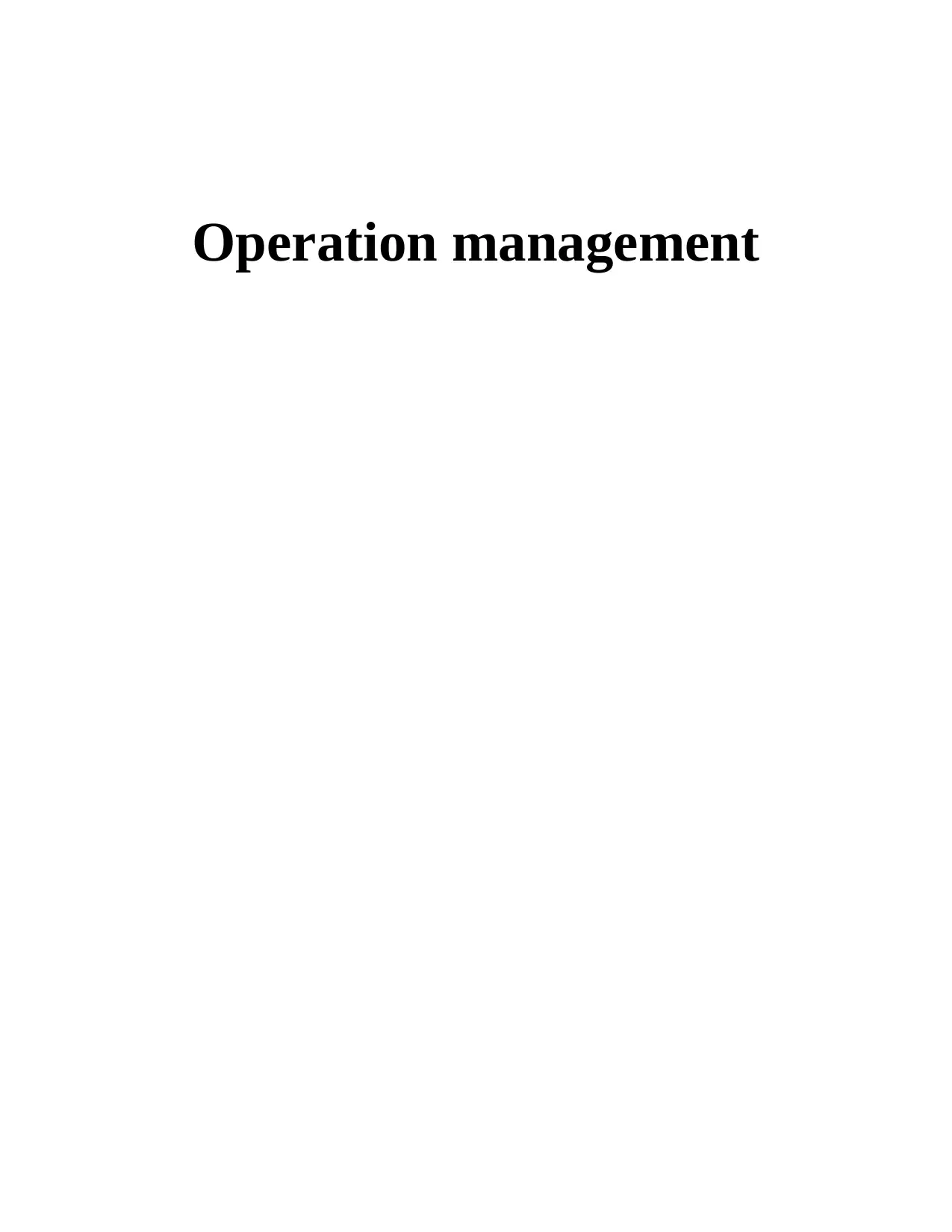
Operation management
Paraphrase This Document
Need a fresh take? Get an instant paraphrase of this document with our AI Paraphraser
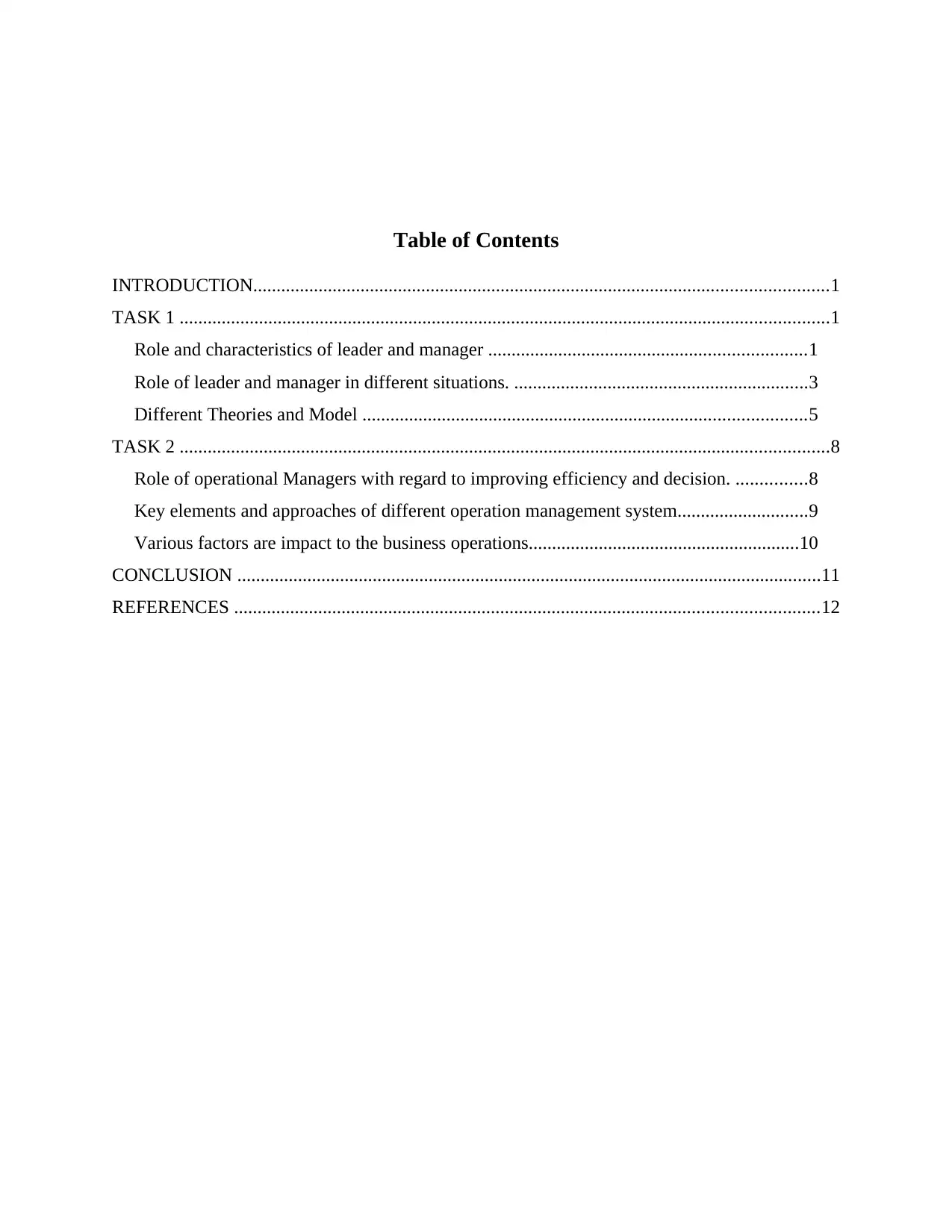
Table of Contents
INTRODUCTION...........................................................................................................................1
TASK 1 ...........................................................................................................................................1
Role and characteristics of leader and manager ....................................................................1
Role of leader and manager in different situations. ...............................................................3
Different Theories and Model ...............................................................................................5
TASK 2 ...........................................................................................................................................8
Role of operational Managers with regard to improving efficiency and decision. ...............8
Key elements and approaches of different operation management system............................9
Various factors are impact to the business operations..........................................................10
CONCLUSION .............................................................................................................................11
REFERENCES .............................................................................................................................12
INTRODUCTION...........................................................................................................................1
TASK 1 ...........................................................................................................................................1
Role and characteristics of leader and manager ....................................................................1
Role of leader and manager in different situations. ...............................................................3
Different Theories and Model ...............................................................................................5
TASK 2 ...........................................................................................................................................8
Role of operational Managers with regard to improving efficiency and decision. ...............8
Key elements and approaches of different operation management system............................9
Various factors are impact to the business operations..........................................................10
CONCLUSION .............................................................................................................................11
REFERENCES .............................................................................................................................12
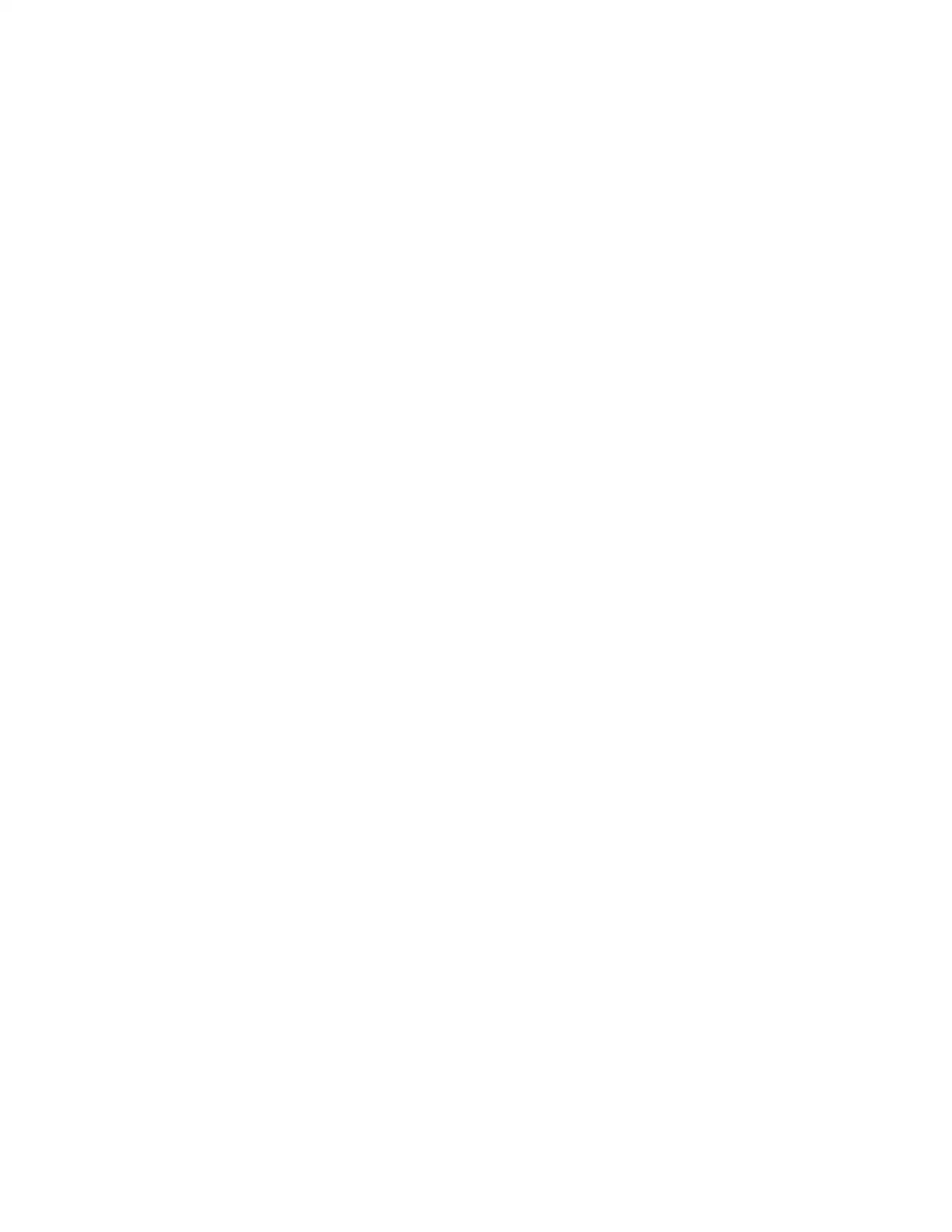
⊘ This is a preview!⊘
Do you want full access?
Subscribe today to unlock all pages.

Trusted by 1+ million students worldwide
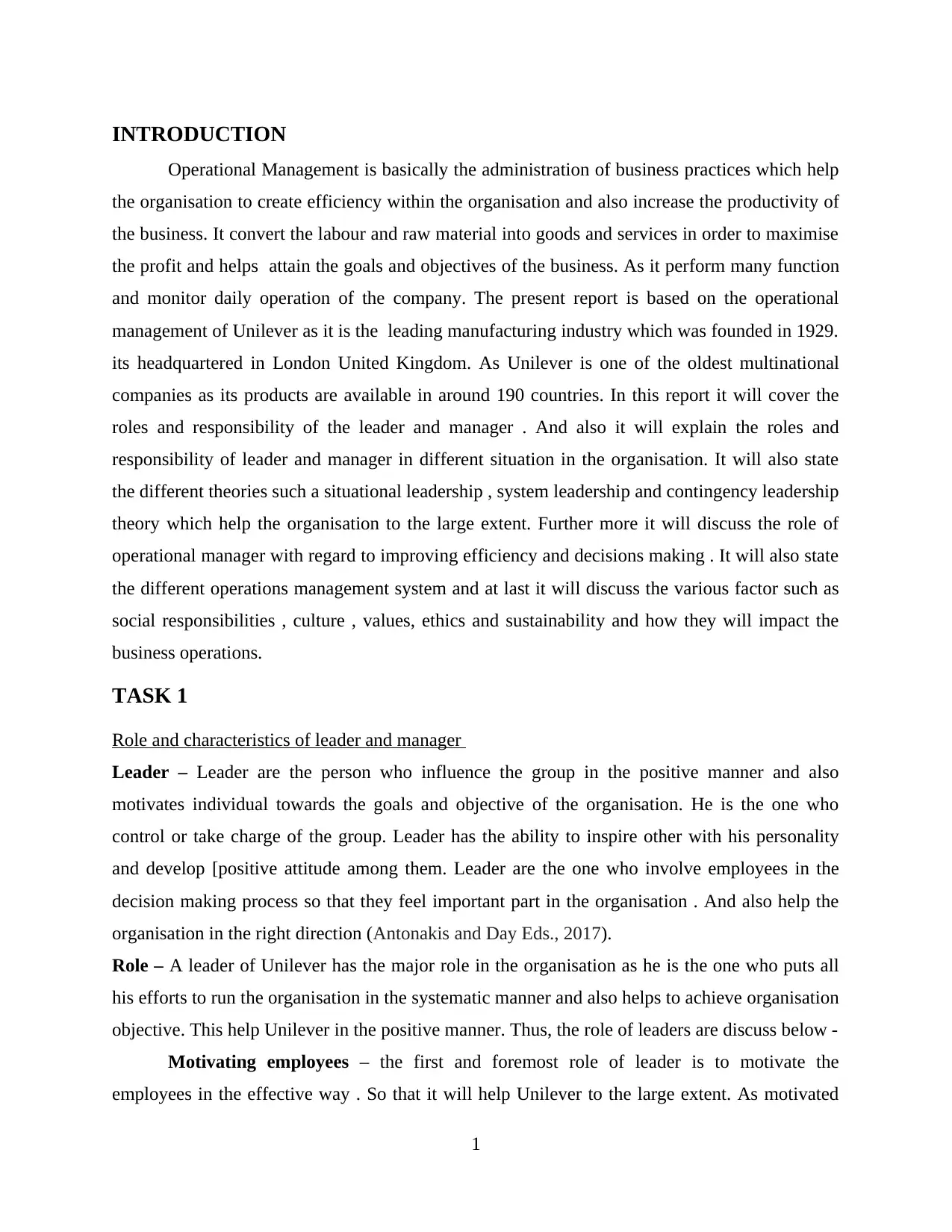
INTRODUCTION
Operational Management is basically the administration of business practices which help
the organisation to create efficiency within the organisation and also increase the productivity of
the business. It convert the labour and raw material into goods and services in order to maximise
the profit and helps attain the goals and objectives of the business. As it perform many function
and monitor daily operation of the company. The present report is based on the operational
management of Unilever as it is the leading manufacturing industry which was founded in 1929.
its headquartered in London United Kingdom. As Unilever is one of the oldest multinational
companies as its products are available in around 190 countries. In this report it will cover the
roles and responsibility of the leader and manager . And also it will explain the roles and
responsibility of leader and manager in different situation in the organisation. It will also state
the different theories such a situational leadership , system leadership and contingency leadership
theory which help the organisation to the large extent. Further more it will discuss the role of
operational manager with regard to improving efficiency and decisions making . It will also state
the different operations management system and at last it will discuss the various factor such as
social responsibilities , culture , values, ethics and sustainability and how they will impact the
business operations.
TASK 1
Role and characteristics of leader and manager
Leader – Leader are the person who influence the group in the positive manner and also
motivates individual towards the goals and objective of the organisation. He is the one who
control or take charge of the group. Leader has the ability to inspire other with his personality
and develop [positive attitude among them. Leader are the one who involve employees in the
decision making process so that they feel important part in the organisation . And also help the
organisation in the right direction (Antonakis and Day Eds., 2017).
Role – A leader of Unilever has the major role in the organisation as he is the one who puts all
his efforts to run the organisation in the systematic manner and also helps to achieve organisation
objective. This help Unilever in the positive manner. Thus, the role of leaders are discuss below -
Motivating employees – the first and foremost role of leader is to motivate the
employees in the effective way . So that it will help Unilever to the large extent. As motivated
1
Operational Management is basically the administration of business practices which help
the organisation to create efficiency within the organisation and also increase the productivity of
the business. It convert the labour and raw material into goods and services in order to maximise
the profit and helps attain the goals and objectives of the business. As it perform many function
and monitor daily operation of the company. The present report is based on the operational
management of Unilever as it is the leading manufacturing industry which was founded in 1929.
its headquartered in London United Kingdom. As Unilever is one of the oldest multinational
companies as its products are available in around 190 countries. In this report it will cover the
roles and responsibility of the leader and manager . And also it will explain the roles and
responsibility of leader and manager in different situation in the organisation. It will also state
the different theories such a situational leadership , system leadership and contingency leadership
theory which help the organisation to the large extent. Further more it will discuss the role of
operational manager with regard to improving efficiency and decisions making . It will also state
the different operations management system and at last it will discuss the various factor such as
social responsibilities , culture , values, ethics and sustainability and how they will impact the
business operations.
TASK 1
Role and characteristics of leader and manager
Leader – Leader are the person who influence the group in the positive manner and also
motivates individual towards the goals and objective of the organisation. He is the one who
control or take charge of the group. Leader has the ability to inspire other with his personality
and develop [positive attitude among them. Leader are the one who involve employees in the
decision making process so that they feel important part in the organisation . And also help the
organisation in the right direction (Antonakis and Day Eds., 2017).
Role – A leader of Unilever has the major role in the organisation as he is the one who puts all
his efforts to run the organisation in the systematic manner and also helps to achieve organisation
objective. This help Unilever in the positive manner. Thus, the role of leaders are discuss below -
Motivating employees – the first and foremost role of leader is to motivate the
employees in the effective way . So that it will help Unilever to the large extent. As motivated
1
Paraphrase This Document
Need a fresh take? Get an instant paraphrase of this document with our AI Paraphraser
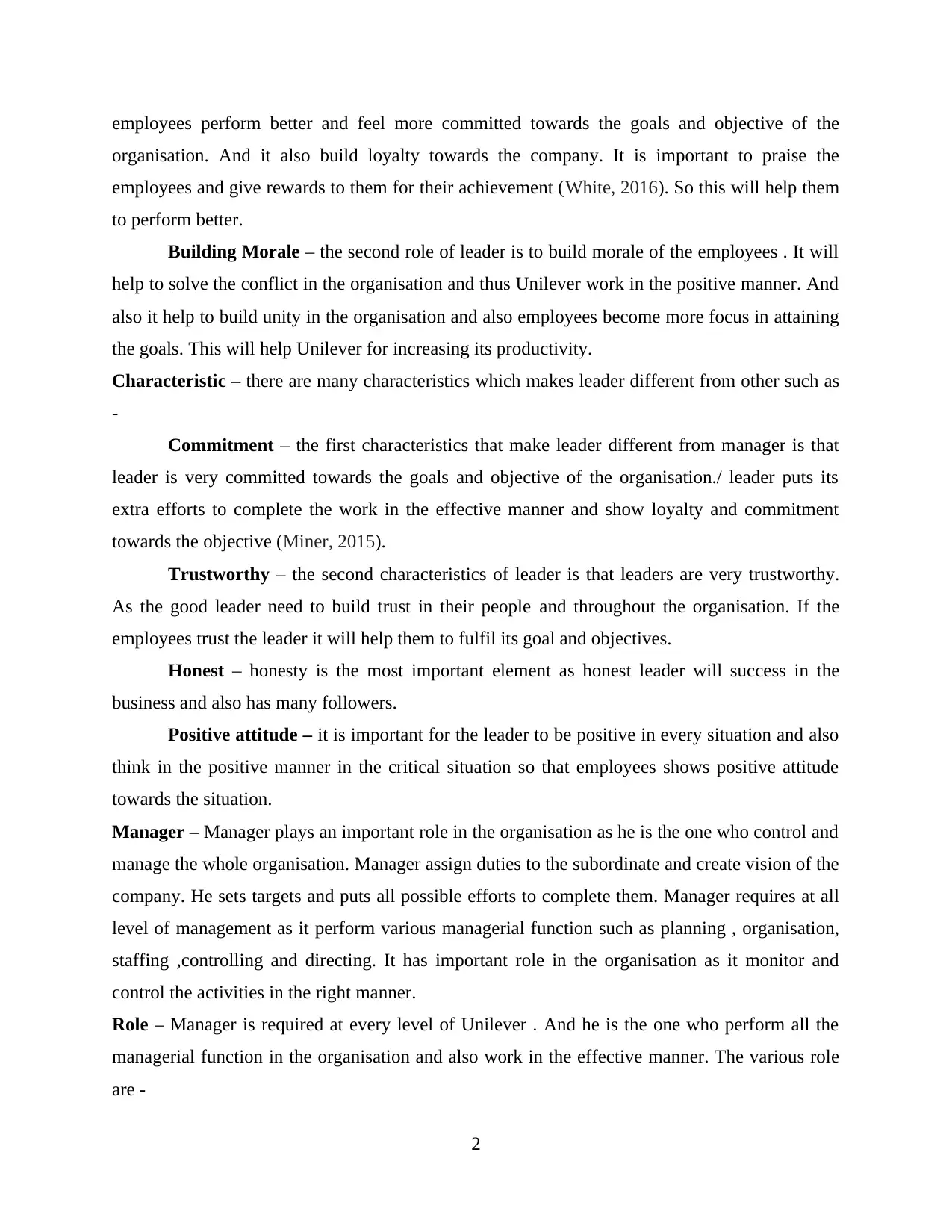
employees perform better and feel more committed towards the goals and objective of the
organisation. And it also build loyalty towards the company. It is important to praise the
employees and give rewards to them for their achievement (White, 2016). So this will help them
to perform better.
Building Morale – the second role of leader is to build morale of the employees . It will
help to solve the conflict in the organisation and thus Unilever work in the positive manner. And
also it help to build unity in the organisation and also employees become more focus in attaining
the goals. This will help Unilever for increasing its productivity.
Characteristic – there are many characteristics which makes leader different from other such as
-
Commitment – the first characteristics that make leader different from manager is that
leader is very committed towards the goals and objective of the organisation./ leader puts its
extra efforts to complete the work in the effective manner and show loyalty and commitment
towards the objective (Miner, 2015).
Trustworthy – the second characteristics of leader is that leaders are very trustworthy.
As the good leader need to build trust in their people and throughout the organisation. If the
employees trust the leader it will help them to fulfil its goal and objectives.
Honest – honesty is the most important element as honest leader will success in the
business and also has many followers.
Positive attitude – it is important for the leader to be positive in every situation and also
think in the positive manner in the critical situation so that employees shows positive attitude
towards the situation.
Manager – Manager plays an important role in the organisation as he is the one who control and
manage the whole organisation. Manager assign duties to the subordinate and create vision of the
company. He sets targets and puts all possible efforts to complete them. Manager requires at all
level of management as it perform various managerial function such as planning , organisation,
staffing ,controlling and directing. It has important role in the organisation as it monitor and
control the activities in the right manner.
Role – Manager is required at every level of Unilever . And he is the one who perform all the
managerial function in the organisation and also work in the effective manner. The various role
are -
2
organisation. And it also build loyalty towards the company. It is important to praise the
employees and give rewards to them for their achievement (White, 2016). So this will help them
to perform better.
Building Morale – the second role of leader is to build morale of the employees . It will
help to solve the conflict in the organisation and thus Unilever work in the positive manner. And
also it help to build unity in the organisation and also employees become more focus in attaining
the goals. This will help Unilever for increasing its productivity.
Characteristic – there are many characteristics which makes leader different from other such as
-
Commitment – the first characteristics that make leader different from manager is that
leader is very committed towards the goals and objective of the organisation./ leader puts its
extra efforts to complete the work in the effective manner and show loyalty and commitment
towards the objective (Miner, 2015).
Trustworthy – the second characteristics of leader is that leaders are very trustworthy.
As the good leader need to build trust in their people and throughout the organisation. If the
employees trust the leader it will help them to fulfil its goal and objectives.
Honest – honesty is the most important element as honest leader will success in the
business and also has many followers.
Positive attitude – it is important for the leader to be positive in every situation and also
think in the positive manner in the critical situation so that employees shows positive attitude
towards the situation.
Manager – Manager plays an important role in the organisation as he is the one who control and
manage the whole organisation. Manager assign duties to the subordinate and create vision of the
company. He sets targets and puts all possible efforts to complete them. Manager requires at all
level of management as it perform various managerial function such as planning , organisation,
staffing ,controlling and directing. It has important role in the organisation as it monitor and
control the activities in the right manner.
Role – Manager is required at every level of Unilever . And he is the one who perform all the
managerial function in the organisation and also work in the effective manner. The various role
are -
2
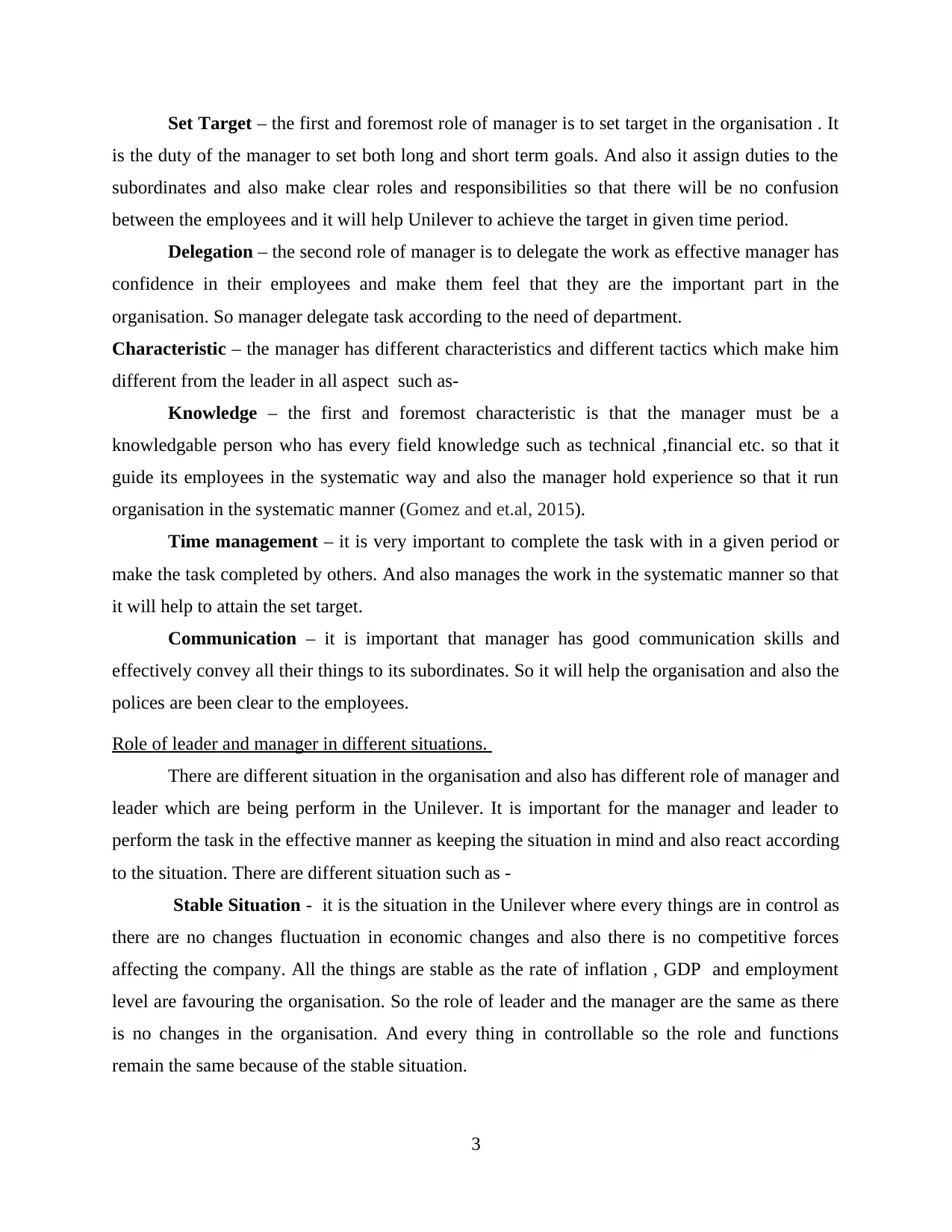
Set Target – the first and foremost role of manager is to set target in the organisation . It
is the duty of the manager to set both long and short term goals. And also it assign duties to the
subordinates and also make clear roles and responsibilities so that there will be no confusion
between the employees and it will help Unilever to achieve the target in given time period.
Delegation – the second role of manager is to delegate the work as effective manager has
confidence in their employees and make them feel that they are the important part in the
organisation. So manager delegate task according to the need of department.
Characteristic – the manager has different characteristics and different tactics which make him
different from the leader in all aspect such as-
Knowledge – the first and foremost characteristic is that the manager must be a
knowledgable person who has every field knowledge such as technical ,financial etc. so that it
guide its employees in the systematic way and also the manager hold experience so that it run
organisation in the systematic manner (Gomez and et.al, 2015).
Time management – it is very important to complete the task with in a given period or
make the task completed by others. And also manages the work in the systematic manner so that
it will help to attain the set target.
Communication – it is important that manager has good communication skills and
effectively convey all their things to its subordinates. So it will help the organisation and also the
polices are been clear to the employees.
Role of leader and manager in different situations.
There are different situation in the organisation and also has different role of manager and
leader which are being perform in the Unilever. It is important for the manager and leader to
perform the task in the effective manner as keeping the situation in mind and also react according
to the situation. There are different situation such as -
Stable Situation - it is the situation in the Unilever where every things are in control as
there are no changes fluctuation in economic changes and also there is no competitive forces
affecting the company. All the things are stable as the rate of inflation , GDP and employment
level are favouring the organisation. So the role of leader and the manager are the same as there
is no changes in the organisation. And every thing in controllable so the role and functions
remain the same because of the stable situation.
3
is the duty of the manager to set both long and short term goals. And also it assign duties to the
subordinates and also make clear roles and responsibilities so that there will be no confusion
between the employees and it will help Unilever to achieve the target in given time period.
Delegation – the second role of manager is to delegate the work as effective manager has
confidence in their employees and make them feel that they are the important part in the
organisation. So manager delegate task according to the need of department.
Characteristic – the manager has different characteristics and different tactics which make him
different from the leader in all aspect such as-
Knowledge – the first and foremost characteristic is that the manager must be a
knowledgable person who has every field knowledge such as technical ,financial etc. so that it
guide its employees in the systematic way and also the manager hold experience so that it run
organisation in the systematic manner (Gomez and et.al, 2015).
Time management – it is very important to complete the task with in a given period or
make the task completed by others. And also manages the work in the systematic manner so that
it will help to attain the set target.
Communication – it is important that manager has good communication skills and
effectively convey all their things to its subordinates. So it will help the organisation and also the
polices are been clear to the employees.
Role of leader and manager in different situations.
There are different situation in the organisation and also has different role of manager and
leader which are being perform in the Unilever. It is important for the manager and leader to
perform the task in the effective manner as keeping the situation in mind and also react according
to the situation. There are different situation such as -
Stable Situation - it is the situation in the Unilever where every things are in control as
there are no changes fluctuation in economic changes and also there is no competitive forces
affecting the company. All the things are stable as the rate of inflation , GDP and employment
level are favouring the organisation. So the role of leader and the manager are the same as there
is no changes in the organisation. And every thing in controllable so the role and functions
remain the same because of the stable situation.
3
⊘ This is a preview!⊘
Do you want full access?
Subscribe today to unlock all pages.

Trusted by 1+ million students worldwide
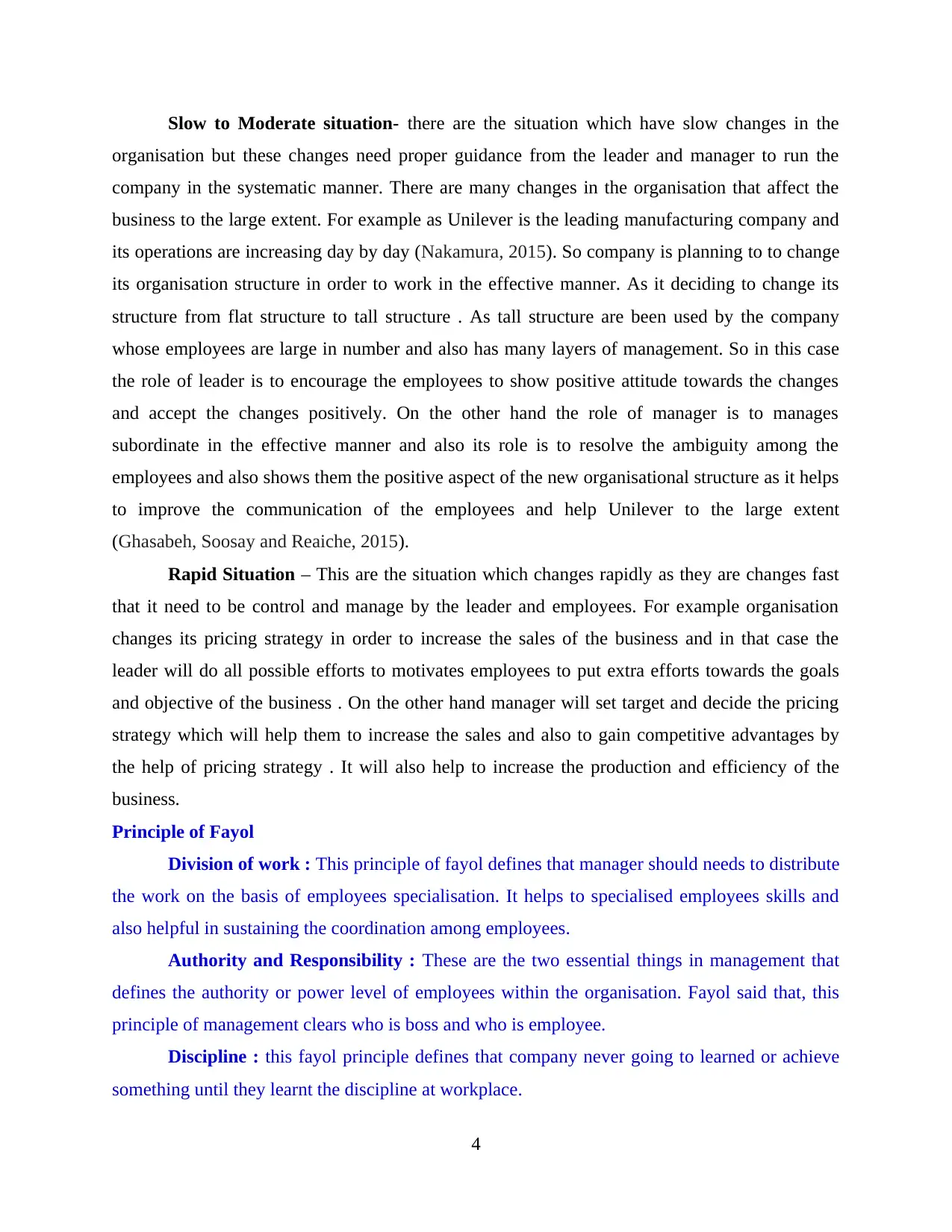
Slow to Moderate situation- there are the situation which have slow changes in the
organisation but these changes need proper guidance from the leader and manager to run the
company in the systematic manner. There are many changes in the organisation that affect the
business to the large extent. For example as Unilever is the leading manufacturing company and
its operations are increasing day by day (Nakamura, 2015). So company is planning to to change
its organisation structure in order to work in the effective manner. As it deciding to change its
structure from flat structure to tall structure . As tall structure are been used by the company
whose employees are large in number and also has many layers of management. So in this case
the role of leader is to encourage the employees to show positive attitude towards the changes
and accept the changes positively. On the other hand the role of manager is to manages
subordinate in the effective manner and also its role is to resolve the ambiguity among the
employees and also shows them the positive aspect of the new organisational structure as it helps
to improve the communication of the employees and help Unilever to the large extent
(Ghasabeh, Soosay and Reaiche, 2015).
Rapid Situation – This are the situation which changes rapidly as they are changes fast
that it need to be control and manage by the leader and employees. For example organisation
changes its pricing strategy in order to increase the sales of the business and in that case the
leader will do all possible efforts to motivates employees to put extra efforts towards the goals
and objective of the business . On the other hand manager will set target and decide the pricing
strategy which will help them to increase the sales and also to gain competitive advantages by
the help of pricing strategy . It will also help to increase the production and efficiency of the
business.
Principle of Fayol
Division of work : This principle of fayol defines that manager should needs to distribute
the work on the basis of employees specialisation. It helps to specialised employees skills and
also helpful in sustaining the coordination among employees.
Authority and Responsibility : These are the two essential things in management that
defines the authority or power level of employees within the organisation. Fayol said that, this
principle of management clears who is boss and who is employee.
Discipline : this fayol principle defines that company never going to learned or achieve
something until they learnt the discipline at workplace.
4
organisation but these changes need proper guidance from the leader and manager to run the
company in the systematic manner. There are many changes in the organisation that affect the
business to the large extent. For example as Unilever is the leading manufacturing company and
its operations are increasing day by day (Nakamura, 2015). So company is planning to to change
its organisation structure in order to work in the effective manner. As it deciding to change its
structure from flat structure to tall structure . As tall structure are been used by the company
whose employees are large in number and also has many layers of management. So in this case
the role of leader is to encourage the employees to show positive attitude towards the changes
and accept the changes positively. On the other hand the role of manager is to manages
subordinate in the effective manner and also its role is to resolve the ambiguity among the
employees and also shows them the positive aspect of the new organisational structure as it helps
to improve the communication of the employees and help Unilever to the large extent
(Ghasabeh, Soosay and Reaiche, 2015).
Rapid Situation – This are the situation which changes rapidly as they are changes fast
that it need to be control and manage by the leader and employees. For example organisation
changes its pricing strategy in order to increase the sales of the business and in that case the
leader will do all possible efforts to motivates employees to put extra efforts towards the goals
and objective of the business . On the other hand manager will set target and decide the pricing
strategy which will help them to increase the sales and also to gain competitive advantages by
the help of pricing strategy . It will also help to increase the production and efficiency of the
business.
Principle of Fayol
Division of work : This principle of fayol defines that manager should needs to distribute
the work on the basis of employees specialisation. It helps to specialised employees skills and
also helpful in sustaining the coordination among employees.
Authority and Responsibility : These are the two essential things in management that
defines the authority or power level of employees within the organisation. Fayol said that, this
principle of management clears who is boss and who is employee.
Discipline : this fayol principle defines that company never going to learned or achieve
something until they learnt the discipline at workplace.
4
Paraphrase This Document
Need a fresh take? Get an instant paraphrase of this document with our AI Paraphraser
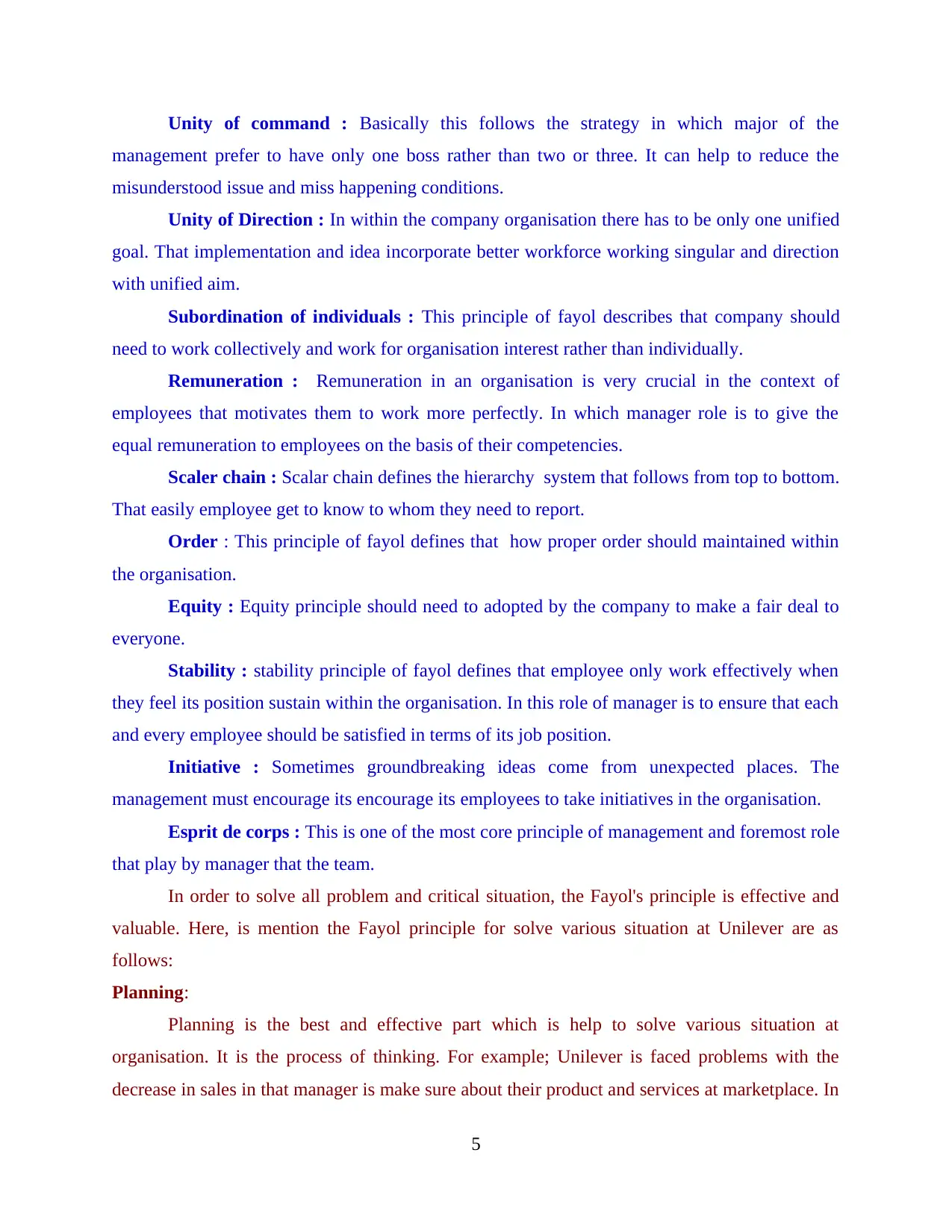
Unity of command : Basically this follows the strategy in which major of the
management prefer to have only one boss rather than two or three. It can help to reduce the
misunderstood issue and miss happening conditions.
Unity of Direction : In within the company organisation there has to be only one unified
goal. That implementation and idea incorporate better workforce working singular and direction
with unified aim.
Subordination of individuals : This principle of fayol describes that company should
need to work collectively and work for organisation interest rather than individually.
Remuneration : Remuneration in an organisation is very crucial in the context of
employees that motivates them to work more perfectly. In which manager role is to give the
equal remuneration to employees on the basis of their competencies.
Scaler chain : Scalar chain defines the hierarchy system that follows from top to bottom.
That easily employee get to know to whom they need to report.
Order : This principle of fayol defines that how proper order should maintained within
the organisation.
Equity : Equity principle should need to adopted by the company to make a fair deal to
everyone.
Stability : stability principle of fayol defines that employee only work effectively when
they feel its position sustain within the organisation. In this role of manager is to ensure that each
and every employee should be satisfied in terms of its job position.
Initiative : Sometimes groundbreaking ideas come from unexpected places. The
management must encourage its encourage its employees to take initiatives in the organisation.
Esprit de corps : This is one of the most core principle of management and foremost role
that play by manager that the team.
In order to solve all problem and critical situation, the Fayol's principle is effective and
valuable. Here, is mention the Fayol principle for solve various situation at Unilever are as
follows:
Planning:
Planning is the best and effective part which is help to solve various situation at
organisation. It is the process of thinking. For example; Unilever is faced problems with the
decrease in sales in that manager is make sure about their product and services at marketplace. In
5
management prefer to have only one boss rather than two or three. It can help to reduce the
misunderstood issue and miss happening conditions.
Unity of Direction : In within the company organisation there has to be only one unified
goal. That implementation and idea incorporate better workforce working singular and direction
with unified aim.
Subordination of individuals : This principle of fayol describes that company should
need to work collectively and work for organisation interest rather than individually.
Remuneration : Remuneration in an organisation is very crucial in the context of
employees that motivates them to work more perfectly. In which manager role is to give the
equal remuneration to employees on the basis of their competencies.
Scaler chain : Scalar chain defines the hierarchy system that follows from top to bottom.
That easily employee get to know to whom they need to report.
Order : This principle of fayol defines that how proper order should maintained within
the organisation.
Equity : Equity principle should need to adopted by the company to make a fair deal to
everyone.
Stability : stability principle of fayol defines that employee only work effectively when
they feel its position sustain within the organisation. In this role of manager is to ensure that each
and every employee should be satisfied in terms of its job position.
Initiative : Sometimes groundbreaking ideas come from unexpected places. The
management must encourage its encourage its employees to take initiatives in the organisation.
Esprit de corps : This is one of the most core principle of management and foremost role
that play by manager that the team.
In order to solve all problem and critical situation, the Fayol's principle is effective and
valuable. Here, is mention the Fayol principle for solve various situation at Unilever are as
follows:
Planning:
Planning is the best and effective part which is help to solve various situation at
organisation. It is the process of thinking. For example; Unilever is faced problems with the
decrease in sales in that manager is make sure about their product and services at marketplace. In
5
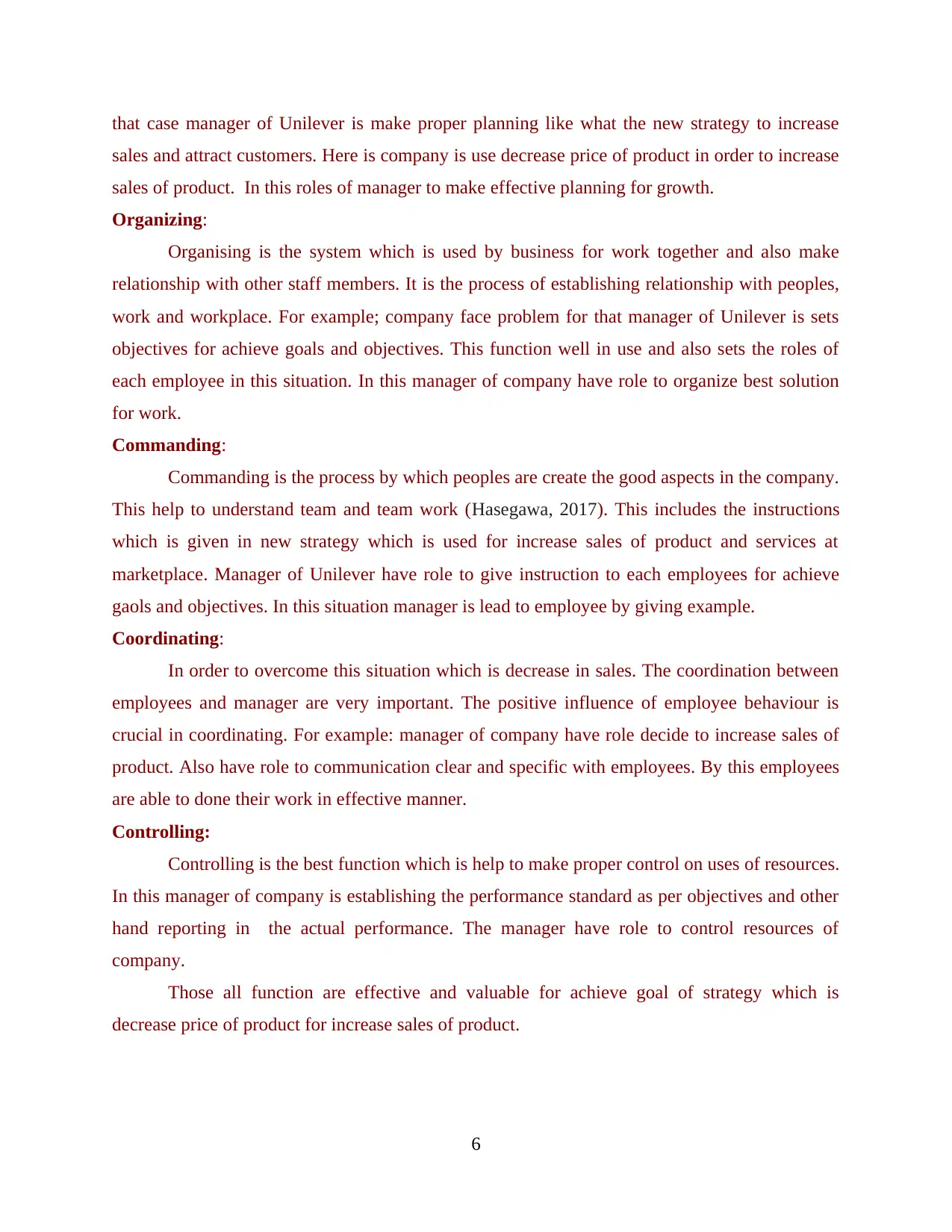
that case manager of Unilever is make proper planning like what the new strategy to increase
sales and attract customers. Here is company is use decrease price of product in order to increase
sales of product. In this roles of manager to make effective planning for growth.
Organizing:
Organising is the system which is used by business for work together and also make
relationship with other staff members. It is the process of establishing relationship with peoples,
work and workplace. For example; company face problem for that manager of Unilever is sets
objectives for achieve goals and objectives. This function well in use and also sets the roles of
each employee in this situation. In this manager of company have role to organize best solution
for work.
Commanding:
Commanding is the process by which peoples are create the good aspects in the company.
This help to understand team and team work (Hasegawa, 2017). This includes the instructions
which is given in new strategy which is used for increase sales of product and services at
marketplace. Manager of Unilever have role to give instruction to each employees for achieve
gaols and objectives. In this situation manager is lead to employee by giving example.
Coordinating:
In order to overcome this situation which is decrease in sales. The coordination between
employees and manager are very important. The positive influence of employee behaviour is
crucial in coordinating. For example: manager of company have role decide to increase sales of
product. Also have role to communication clear and specific with employees. By this employees
are able to done their work in effective manner.
Controlling:
Controlling is the best function which is help to make proper control on uses of resources.
In this manager of company is establishing the performance standard as per objectives and other
hand reporting in the actual performance. The manager have role to control resources of
company.
Those all function are effective and valuable for achieve goal of strategy which is
decrease price of product for increase sales of product.
6
sales and attract customers. Here is company is use decrease price of product in order to increase
sales of product. In this roles of manager to make effective planning for growth.
Organizing:
Organising is the system which is used by business for work together and also make
relationship with other staff members. It is the process of establishing relationship with peoples,
work and workplace. For example; company face problem for that manager of Unilever is sets
objectives for achieve goals and objectives. This function well in use and also sets the roles of
each employee in this situation. In this manager of company have role to organize best solution
for work.
Commanding:
Commanding is the process by which peoples are create the good aspects in the company.
This help to understand team and team work (Hasegawa, 2017). This includes the instructions
which is given in new strategy which is used for increase sales of product and services at
marketplace. Manager of Unilever have role to give instruction to each employees for achieve
gaols and objectives. In this situation manager is lead to employee by giving example.
Coordinating:
In order to overcome this situation which is decrease in sales. The coordination between
employees and manager are very important. The positive influence of employee behaviour is
crucial in coordinating. For example: manager of company have role decide to increase sales of
product. Also have role to communication clear and specific with employees. By this employees
are able to done their work in effective manner.
Controlling:
Controlling is the best function which is help to make proper control on uses of resources.
In this manager of company is establishing the performance standard as per objectives and other
hand reporting in the actual performance. The manager have role to control resources of
company.
Those all function are effective and valuable for achieve goal of strategy which is
decrease price of product for increase sales of product.
6
⊘ This is a preview!⊘
Do you want full access?
Subscribe today to unlock all pages.

Trusted by 1+ million students worldwide
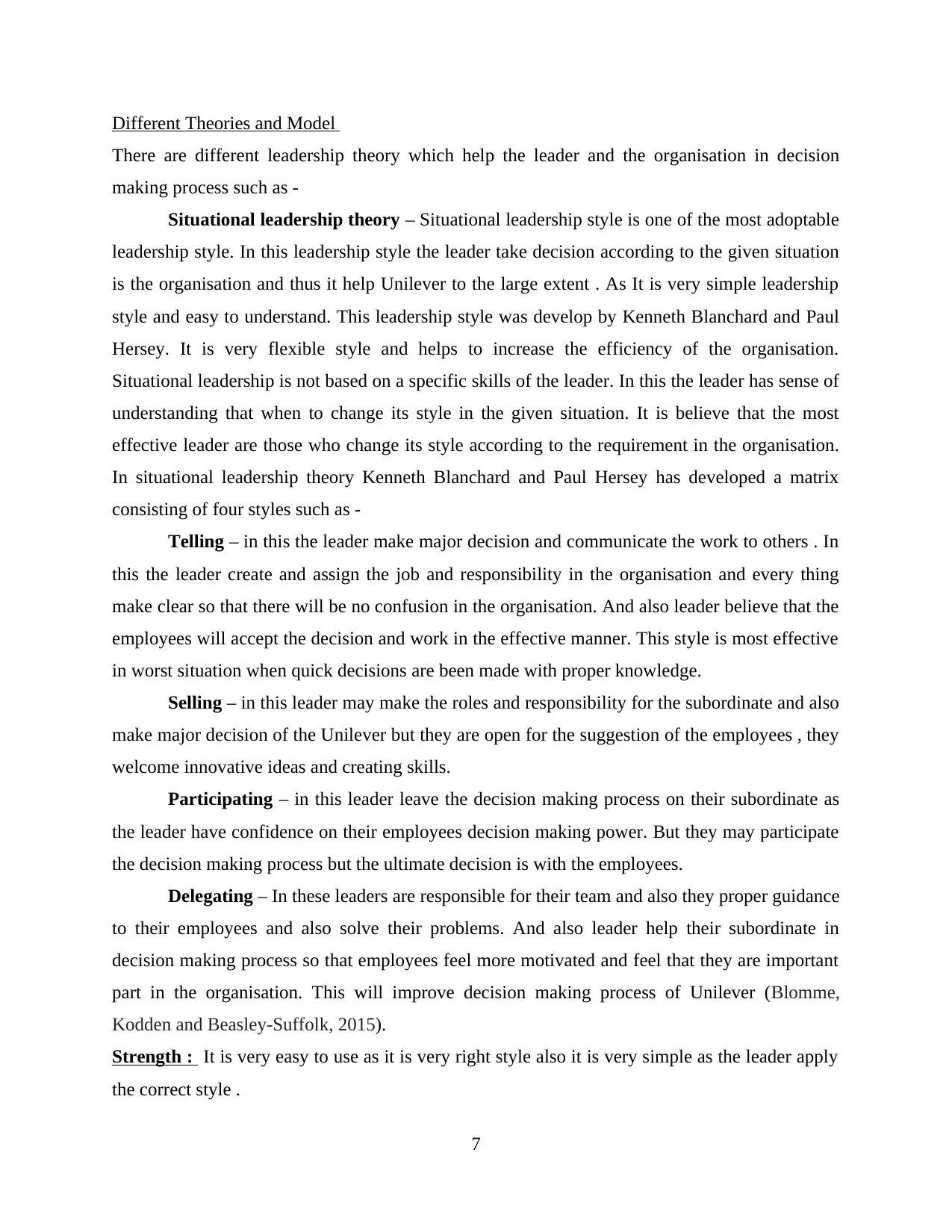
Different Theories and Model
There are different leadership theory which help the leader and the organisation in decision
making process such as -
Situational leadership theory – Situational leadership style is one of the most adoptable
leadership style. In this leadership style the leader take decision according to the given situation
is the organisation and thus it help Unilever to the large extent . As It is very simple leadership
style and easy to understand. This leadership style was develop by Kenneth Blanchard and Paul
Hersey. It is very flexible style and helps to increase the efficiency of the organisation.
Situational leadership is not based on a specific skills of the leader. In this the leader has sense of
understanding that when to change its style in the given situation. It is believe that the most
effective leader are those who change its style according to the requirement in the organisation.
In situational leadership theory Kenneth Blanchard and Paul Hersey has developed a matrix
consisting of four styles such as -
Telling – in this the leader make major decision and communicate the work to others . In
this the leader create and assign the job and responsibility in the organisation and every thing
make clear so that there will be no confusion in the organisation. And also leader believe that the
employees will accept the decision and work in the effective manner. This style is most effective
in worst situation when quick decisions are been made with proper knowledge.
Selling – in this leader may make the roles and responsibility for the subordinate and also
make major decision of the Unilever but they are open for the suggestion of the employees , they
welcome innovative ideas and creating skills.
Participating – in this leader leave the decision making process on their subordinate as
the leader have confidence on their employees decision making power. But they may participate
the decision making process but the ultimate decision is with the employees.
Delegating – In these leaders are responsible for their team and also they proper guidance
to their employees and also solve their problems. And also leader help their subordinate in
decision making process so that employees feel more motivated and feel that they are important
part in the organisation. This will improve decision making process of Unilever (Blomme,
Kodden and Beasley-Suffolk, 2015).
Strength : It is very easy to use as it is very right style also it is very simple as the leader apply
the correct style .
7
There are different leadership theory which help the leader and the organisation in decision
making process such as -
Situational leadership theory – Situational leadership style is one of the most adoptable
leadership style. In this leadership style the leader take decision according to the given situation
is the organisation and thus it help Unilever to the large extent . As It is very simple leadership
style and easy to understand. This leadership style was develop by Kenneth Blanchard and Paul
Hersey. It is very flexible style and helps to increase the efficiency of the organisation.
Situational leadership is not based on a specific skills of the leader. In this the leader has sense of
understanding that when to change its style in the given situation. It is believe that the most
effective leader are those who change its style according to the requirement in the organisation.
In situational leadership theory Kenneth Blanchard and Paul Hersey has developed a matrix
consisting of four styles such as -
Telling – in this the leader make major decision and communicate the work to others . In
this the leader create and assign the job and responsibility in the organisation and every thing
make clear so that there will be no confusion in the organisation. And also leader believe that the
employees will accept the decision and work in the effective manner. This style is most effective
in worst situation when quick decisions are been made with proper knowledge.
Selling – in this leader may make the roles and responsibility for the subordinate and also
make major decision of the Unilever but they are open for the suggestion of the employees , they
welcome innovative ideas and creating skills.
Participating – in this leader leave the decision making process on their subordinate as
the leader have confidence on their employees decision making power. But they may participate
the decision making process but the ultimate decision is with the employees.
Delegating – In these leaders are responsible for their team and also they proper guidance
to their employees and also solve their problems. And also leader help their subordinate in
decision making process so that employees feel more motivated and feel that they are important
part in the organisation. This will improve decision making process of Unilever (Blomme,
Kodden and Beasley-Suffolk, 2015).
Strength : It is very easy to use as it is very right style also it is very simple as the leader apply
the correct style .
7
Paraphrase This Document
Need a fresh take? Get an instant paraphrase of this document with our AI Paraphraser
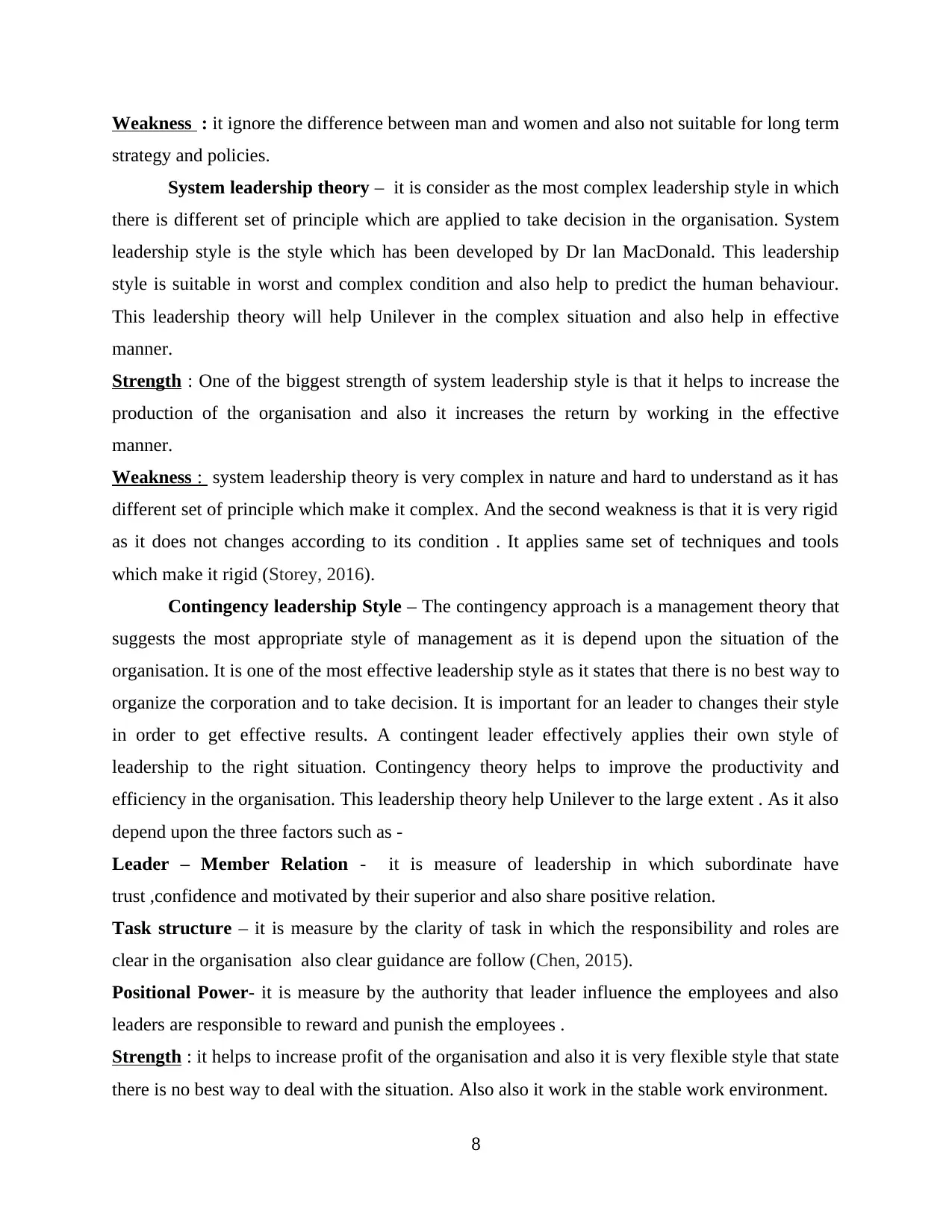
Weakness : it ignore the difference between man and women and also not suitable for long term
strategy and policies.
System leadership theory – it is consider as the most complex leadership style in which
there is different set of principle which are applied to take decision in the organisation. System
leadership style is the style which has been developed by Dr lan MacDonald. This leadership
style is suitable in worst and complex condition and also help to predict the human behaviour.
This leadership theory will help Unilever in the complex situation and also help in effective
manner.
Strength : One of the biggest strength of system leadership style is that it helps to increase the
production of the organisation and also it increases the return by working in the effective
manner.
Weakness : system leadership theory is very complex in nature and hard to understand as it has
different set of principle which make it complex. And the second weakness is that it is very rigid
as it does not changes according to its condition . It applies same set of techniques and tools
which make it rigid (Storey, 2016).
Contingency leadership Style – The contingency approach is a management theory that
suggests the most appropriate style of management as it is depend upon the situation of the
organisation. It is one of the most effective leadership style as it states that there is no best way to
organize the corporation and to take decision. It is important for an leader to changes their style
in order to get effective results. A contingent leader effectively applies their own style of
leadership to the right situation. Contingency theory helps to improve the productivity and
efficiency in the organisation. This leadership theory help Unilever to the large extent . As it also
depend upon the three factors such as -
Leader – Member Relation - it is measure of leadership in which subordinate have
trust ,confidence and motivated by their superior and also share positive relation.
Task structure – it is measure by the clarity of task in which the responsibility and roles are
clear in the organisation also clear guidance are follow (Chen, 2015).
Positional Power- it is measure by the authority that leader influence the employees and also
leaders are responsible to reward and punish the employees .
Strength : it helps to increase profit of the organisation and also it is very flexible style that state
there is no best way to deal with the situation. Also also it work in the stable work environment.
8
strategy and policies.
System leadership theory – it is consider as the most complex leadership style in which
there is different set of principle which are applied to take decision in the organisation. System
leadership style is the style which has been developed by Dr lan MacDonald. This leadership
style is suitable in worst and complex condition and also help to predict the human behaviour.
This leadership theory will help Unilever in the complex situation and also help in effective
manner.
Strength : One of the biggest strength of system leadership style is that it helps to increase the
production of the organisation and also it increases the return by working in the effective
manner.
Weakness : system leadership theory is very complex in nature and hard to understand as it has
different set of principle which make it complex. And the second weakness is that it is very rigid
as it does not changes according to its condition . It applies same set of techniques and tools
which make it rigid (Storey, 2016).
Contingency leadership Style – The contingency approach is a management theory that
suggests the most appropriate style of management as it is depend upon the situation of the
organisation. It is one of the most effective leadership style as it states that there is no best way to
organize the corporation and to take decision. It is important for an leader to changes their style
in order to get effective results. A contingent leader effectively applies their own style of
leadership to the right situation. Contingency theory helps to improve the productivity and
efficiency in the organisation. This leadership theory help Unilever to the large extent . As it also
depend upon the three factors such as -
Leader – Member Relation - it is measure of leadership in which subordinate have
trust ,confidence and motivated by their superior and also share positive relation.
Task structure – it is measure by the clarity of task in which the responsibility and roles are
clear in the organisation also clear guidance are follow (Chen, 2015).
Positional Power- it is measure by the authority that leader influence the employees and also
leaders are responsible to reward and punish the employees .
Strength : it helps to increase profit of the organisation and also it is very flexible style that state
there is no best way to deal with the situation. Also also it work in the stable work environment.
8
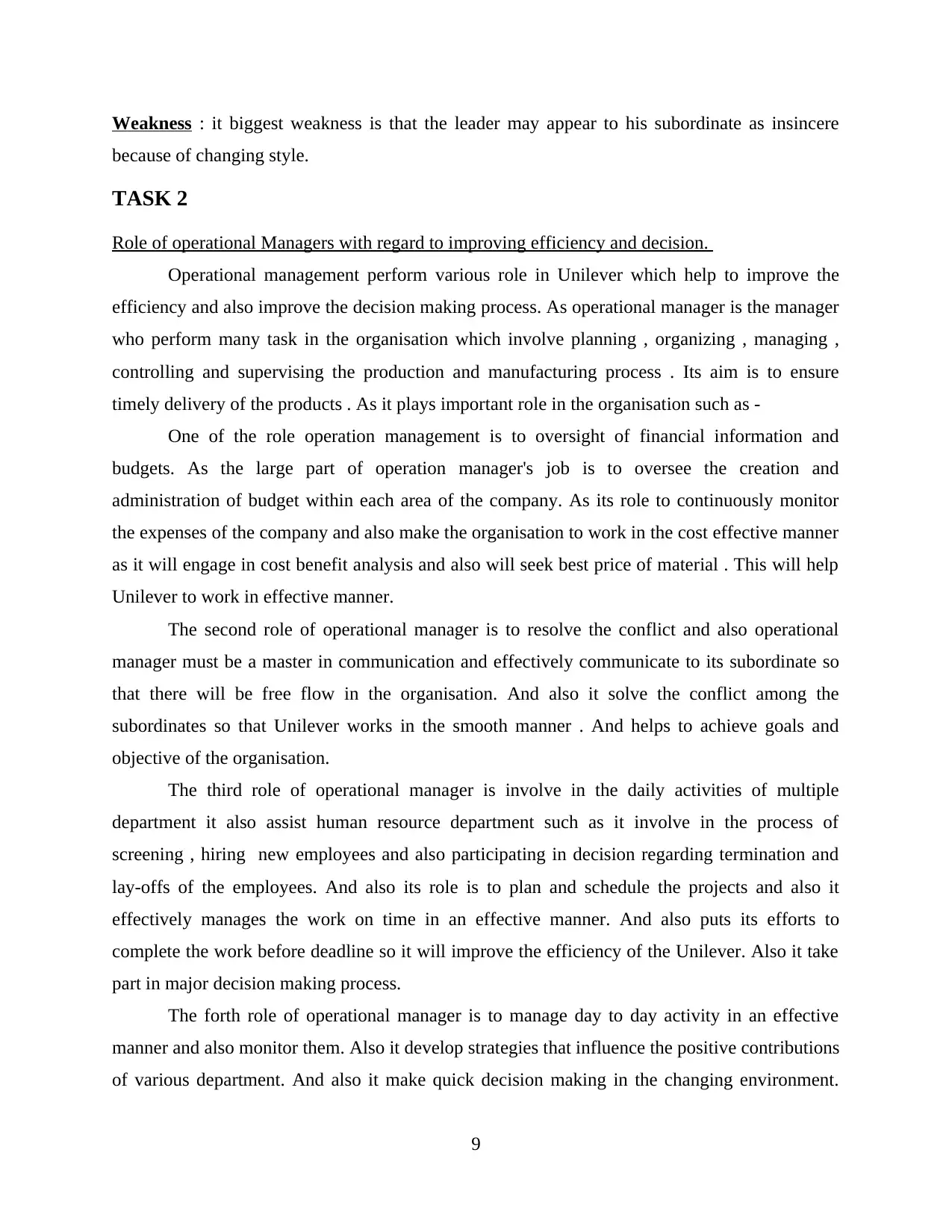
Weakness : it biggest weakness is that the leader may appear to his subordinate as insincere
because of changing style.
TASK 2
Role of operational Managers with regard to improving efficiency and decision.
Operational management perform various role in Unilever which help to improve the
efficiency and also improve the decision making process. As operational manager is the manager
who perform many task in the organisation which involve planning , organizing , managing ,
controlling and supervising the production and manufacturing process . Its aim is to ensure
timely delivery of the products . As it plays important role in the organisation such as -
One of the role operation management is to oversight of financial information and
budgets. As the large part of operation manager's job is to oversee the creation and
administration of budget within each area of the company. As its role to continuously monitor
the expenses of the company and also make the organisation to work in the cost effective manner
as it will engage in cost benefit analysis and also will seek best price of material . This will help
Unilever to work in effective manner.
The second role of operational manager is to resolve the conflict and also operational
manager must be a master in communication and effectively communicate to its subordinate so
that there will be free flow in the organisation. And also it solve the conflict among the
subordinates so that Unilever works in the smooth manner . And helps to achieve goals and
objective of the organisation.
The third role of operational manager is involve in the daily activities of multiple
department it also assist human resource department such as it involve in the process of
screening , hiring new employees and also participating in decision regarding termination and
lay-offs of the employees. And also its role is to plan and schedule the projects and also it
effectively manages the work on time in an effective manner. And also puts its efforts to
complete the work before deadline so it will improve the efficiency of the Unilever. Also it take
part in major decision making process.
The forth role of operational manager is to manage day to day activity in an effective
manner and also monitor them. Also it develop strategies that influence the positive contributions
of various department. And also it make quick decision making in the changing environment.
9
because of changing style.
TASK 2
Role of operational Managers with regard to improving efficiency and decision.
Operational management perform various role in Unilever which help to improve the
efficiency and also improve the decision making process. As operational manager is the manager
who perform many task in the organisation which involve planning , organizing , managing ,
controlling and supervising the production and manufacturing process . Its aim is to ensure
timely delivery of the products . As it plays important role in the organisation such as -
One of the role operation management is to oversight of financial information and
budgets. As the large part of operation manager's job is to oversee the creation and
administration of budget within each area of the company. As its role to continuously monitor
the expenses of the company and also make the organisation to work in the cost effective manner
as it will engage in cost benefit analysis and also will seek best price of material . This will help
Unilever to work in effective manner.
The second role of operational manager is to resolve the conflict and also operational
manager must be a master in communication and effectively communicate to its subordinate so
that there will be free flow in the organisation. And also it solve the conflict among the
subordinates so that Unilever works in the smooth manner . And helps to achieve goals and
objective of the organisation.
The third role of operational manager is involve in the daily activities of multiple
department it also assist human resource department such as it involve in the process of
screening , hiring new employees and also participating in decision regarding termination and
lay-offs of the employees. And also its role is to plan and schedule the projects and also it
effectively manages the work on time in an effective manner. And also puts its efforts to
complete the work before deadline so it will improve the efficiency of the Unilever. Also it take
part in major decision making process.
The forth role of operational manager is to manage day to day activity in an effective
manner and also monitor them. Also it develop strategies that influence the positive contributions
of various department. And also it make quick decision making in the changing environment.
9
⊘ This is a preview!⊘
Do you want full access?
Subscribe today to unlock all pages.

Trusted by 1+ million students worldwide
1 out of 18
Related Documents
Your All-in-One AI-Powered Toolkit for Academic Success.
+13062052269
info@desklib.com
Available 24*7 on WhatsApp / Email
![[object Object]](/_next/static/media/star-bottom.7253800d.svg)
Unlock your academic potential
Copyright © 2020–2026 A2Z Services. All Rights Reserved. Developed and managed by ZUCOL.





